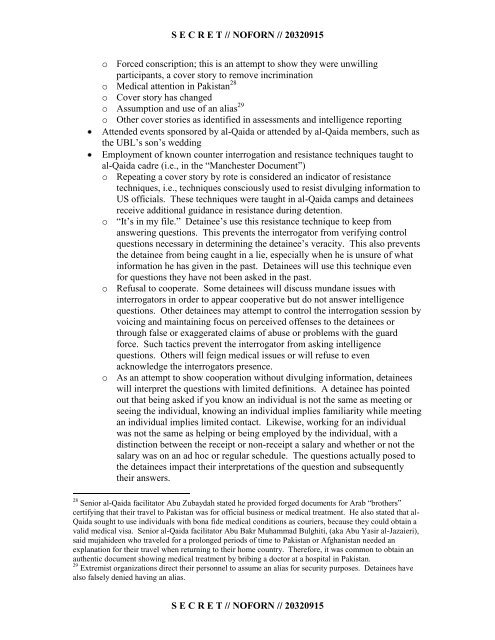linked - Investigating the Terror
linked - Investigating the Terror
linked - Investigating the Terror
Create successful ePaper yourself
Turn your PDF publications into a flip-book with our unique Google optimized e-Paper software.
S E C R E T // NOFORN // 20320915<br />
o Forced conscription; this is an attempt to show <strong>the</strong>y were unwilling<br />
participants, a cover story to remove incrimination<br />
o Medical attention in Pakistan 28<br />
o Cover story has changed<br />
o Assumption and use of an alias 29<br />
o O<strong>the</strong>r cover stories as identified in assessments and intelligence reporting<br />
Attended events sponsored by al-Qaida or attended by al-Qaida members, such as<br />
<strong>the</strong> UBL‟s son‟s wedding<br />
Employment of known counter interrogation and resistance techniques taught to<br />
al-Qaida cadre (i.e., in <strong>the</strong> “Manchester Document”)<br />
o Repeating a cover story by rote is considered an indicator of resistance<br />
techniques, i.e., techniques consciously used to resist divulging information to<br />
US officials. These techniques were taught in al-Qaida camps and detainees<br />
receive additional guidance in resistance during detention.<br />
o “It‟s in my file.” Detainee‟s use this resistance technique to keep from<br />
answering questions. This prevents <strong>the</strong> interrogator from verifying control<br />
questions necessary in determining <strong>the</strong> detainee‟s veracity. This also prevents<br />
<strong>the</strong> detainee from being caught in a lie, especially when he is unsure of what<br />
information he has given in <strong>the</strong> past. Detainees will use this technique even<br />
for questions <strong>the</strong>y have not been asked in <strong>the</strong> past.<br />
o Refusal to cooperate. Some detainees will discuss mundane issues with<br />
interrogators in order to appear cooperative but do not answer intelligence<br />
questions. O<strong>the</strong>r detainees may attempt to control <strong>the</strong> interrogation session by<br />
voicing and maintaining focus on perceived offenses to <strong>the</strong> detainees or<br />
through false or exaggerated claims of abuse or problems with <strong>the</strong> guard<br />
force. Such tactics prevent <strong>the</strong> interrogator from asking intelligence<br />
questions. O<strong>the</strong>rs will feign medical issues or will refuse to even<br />
acknowledge <strong>the</strong> interrogators presence.<br />
o As an attempt to show cooperation without divulging information, detainees<br />
will interpret <strong>the</strong> questions with limited definitions. A detainee has pointed<br />
out that being asked if you know an individual is not <strong>the</strong> same as meeting or<br />
seeing <strong>the</strong> individual, knowing an individual implies familiarity while meeting<br />
an individual implies limited contact. Likewise, working for an individual<br />
was not <strong>the</strong> same as helping or being employed by <strong>the</strong> individual, with a<br />
distinction between <strong>the</strong> receipt or non-receipt a salary and whe<strong>the</strong>r or not <strong>the</strong><br />
salary was on an ad hoc or regular schedule. The questions actually posed to<br />
<strong>the</strong> detainees impact <strong>the</strong>ir interpretations of <strong>the</strong> question and subsequently<br />
<strong>the</strong>ir answers.<br />
28 Senior al-Qaida facilitator Abu Zubaydah stated he provided forged documents for Arab “bro<strong>the</strong>rs”<br />
certifying that <strong>the</strong>ir travel to Pakistan was for official business or medical treatment. He also stated that al-<br />
Qaida sought to use individuals with bona fide medical conditions as couriers, because <strong>the</strong>y could obtain a<br />
valid medical visa. Senior al-Qaida facilitator Abu Bakr Muhammad Bulghiti, (aka Abu Yasir al-Jazaieri),<br />
said mujahideen who traveled for a prolonged periods of time to Pakistan or Afghanistan needed an<br />
explanation for <strong>the</strong>ir travel when returning to <strong>the</strong>ir home country. Therefore, it was common to obtain an<br />
au<strong>the</strong>ntic document showing medical treatment by bribing a doctor at a hospital in Pakistan.<br />
29 Extremist organizations direct <strong>the</strong>ir personnel to assume an alias for security purposes. Detainees have<br />
also falsely denied having an alias.<br />
S E C R E T // NOFORN // 20320915


